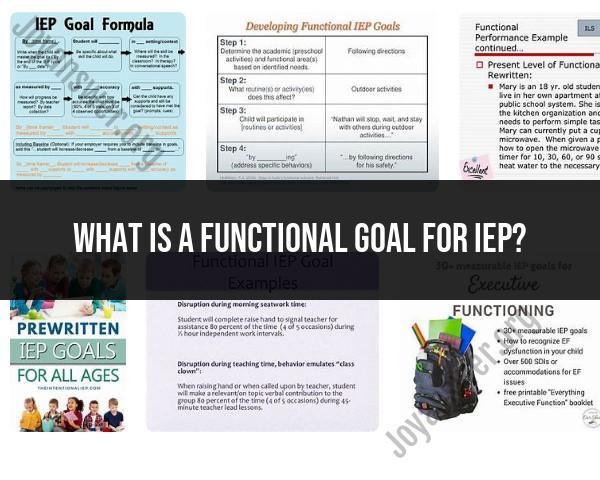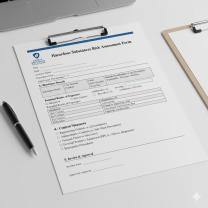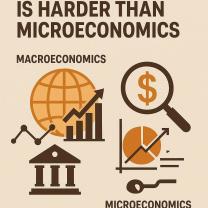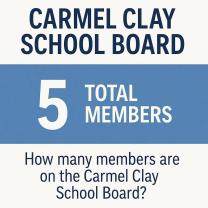What is a functional goal for IEP?
In the context of an Individualized Education Program (IEP), a functional goal is a specific and measurable objective that addresses a student's practical and everyday needs. These goals are designed to help students with disabilities develop or improve skills that are essential for their daily lives and independence. Functional goals in an IEP are highly individualized and tailored to the unique needs of each student. Here's a more detailed explanation of functional goals in an IEP:
Individualized Education Program (IEP): An IEP is a legally mandated plan developed for students with disabilities to ensure that they receive the necessary special education and related services to meet their educational needs. It is a collaborative effort involving teachers, parents, and other educational professionals.
Functional Goals: Functional goals in an IEP are goals that focus on the development of skills and abilities that are essential for a student's daily life, both within and outside of the school setting. These goals are directly related to the student's disability and areas where they may require additional support.
Examples of Functional Goals: Functional goals can vary widely based on the student's needs and abilities. Some examples of functional goals in an IEP may include:
- Communication: Developing effective communication skills, such as using assistive communication devices or sign language.
- Daily Living Skills: Learning and improving skills like dressing, grooming, and personal hygiene.
- Social Interaction: Enhancing social skills, including making friends, engaging in conversations, or appropriately interacting with peers and adults.
- Mobility: Improving physical mobility, such as walking, using a wheelchair, or navigating the school environment.
- Self-Advocacy: Teaching students to advocate for themselves, express their needs, and make decisions regarding their education.
- Occupational and Vocational Skills: Preparing students for future employment by teaching relevant job skills or job-seeking skills.
- Academic Skills: Developing functional academic skills that support independent living and employment, such as reading, writing, and math.
- Behavior Management: Addressing behavioral challenges by setting goals for self-regulation and emotional control.
Measurable Objectives: Functional goals in an IEP should be specific and measurable, meaning that there should be clear criteria to determine whether the goal has been achieved. This allows educators and parents to track progress and make necessary adjustments to the plan.
Progress Monitoring: Progress toward functional goals should be regularly assessed and documented, and any necessary adjustments to the IEP should be made based on this assessment.
Functional goals are a crucial component of an IEP because they help students with disabilities acquire the skills and abilities they need to participate in various aspects of daily life successfully. These goals aim to promote independence, personal growth, and overall well-being for the student. The IEP team, including parents and educators, works collaboratively to set and review these goals to ensure that they are relevant and effective in meeting the student's needs.
Defining Functional Goals within an Individualized Education Program (IEP)
Functional goals are goals that are designed to help students with special needs acquire the skills they need to participate in and be successful in everyday life. These goals are based on the student's individual needs and strengths, and they are intended to help the student achieve greater independence and self-sufficiency.
Functional goals are typically written in a way that is specific, measurable, achievable, relevant, and time-bound (SMART). For example, a functional goal for a student with autism might be:
- "By the end of the school year, the student will be able to independently request assistance from a teacher or peer when needed."
This goal is specific because it identifies the exact behavior that the student is expected to learn. It is measurable because it includes a way to track the student's progress. It is achievable because it is based on the student's current skills and abilities. It is relevant because it is important for the student to be able to request assistance in order to be successful in school and in the community. And it is time-bound because it includes a deadline for when the student is expected to achieve the goal.
Examples of Functional Goals for Students with Special Needs
Functional goals can address a wide range of areas, such as:
- Communication
- Self-care
- Social skills
- Behavior
- Academic skills
- Vocational skills
- Community living skills
Some specific examples of functional goals for students with special needs include:
- The student will be able to use a communication device to request food, drinks, and bathroom breaks.
- The student will be able to dress and groom themselves independently.
- The student will be able to initiate and maintain conversations with peers.
- The student will be able to follow classroom rules and routines.
- The student will be able to read and write at a first-grade level.
- The student will be able to complete simple job tasks, such as sorting and filing.
- The student will be able to use public transportation independently.
The Role of Functional Goals in Supporting Student Development
Functional goals play a critical role in supporting student development. By focusing on skills that are relevant to the student's everyday life, functional goals can help students become more independent and self-sufficient. In addition, functional goals can help students to:
- Develop a sense of self-efficacy
- Increase their motivation to learn
- Improve their social-emotional well-being
- Achieve greater success in school and in the community
Collaborative Goal-Setting in the IEP Process
Functional goals are typically developed through a collaborative process that involves the student, parents, teachers, and other professionals. This collaborative process is important because it helps to ensure that the goals are:
- Based on the student's individual needs and strengths
- Relevant to the student's present levels of performance
- Agreed upon by all members of the IEP team
Evaluating the Success of Functional Goals
It is important to regularly evaluate the success of functional goals. This can be done by collecting data on the student's progress towards the goals. Data can be collected through a variety of methods, such as observation, checklists, and rating scales.
If the student is not making progress towards a goal, the IEP team may need to modify the goal or provide additional support to the student. However, if the student is making progress towards the goal, the team can celebrate the student's success and continue to work towards achieving the goal.













